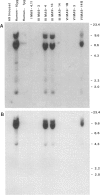Abstract
We have isolated and characterized cDNAs that code for apoproteins having amino acid sequences highly similar to pregnancy-specific beta 1-glycoproteins (PS beta G). cDNAs coding for PS beta Gs, as well as the cDNA clone reported here, are members of the carcinoembryonic antigen (CEA) gene family. The previous localization of CEA-related genes to human chromosome 19, and the high level of DNA sequence conservation in the CEA family, suggested that the PS beta G genes are also located on this chromosome. We demonstrate here that chromosome 19 is indeed the site of PS beta G sequences. Our finding is in contrast to the recently reported indication that pregnancy-specific glycoproteins are encoded in chromosomes X and 6.
Full text
PDF



Images in this article
Selected References
These references are in PubMed. This may not be the complete list of references from this article.
- Barnett T. R., Kretschmer A., Austen D. A., Goebel S. J., Hart J. T., Elting J. J., Kamarck M. E. Carcinoembryonic antigens: alternative splicing accounts for the multiple mRNAs that code for novel members of the carcinoembryonic antigen family. J Cell Biol. 1989 Feb;108(2):267–276. doi: 10.1083/jcb.108.2.267. [DOI] [PMC free article] [PubMed] [Google Scholar]
- Barnett T., Goebel S. J., Nothdurft M. A., Elting J. J. Carcinoembryonic antigen family: characterization of cDNAs coding for NCA and CEA and suggestion of nonrandom sequence variation in their conserved loop-domains. Genomics. 1988 Jul;3(1):59–66. doi: 10.1016/0888-7543(88)90160-7. [DOI] [PubMed] [Google Scholar]
- Barton D. E., Arquint M., Roder J., Dunn R., Francke U. The myelin-associated glycoprotein gene: mapping to human chromosome 19 and mouse chromosome 7 and expression in quivering mice. Genomics. 1987 Oct;1(2):107–112. doi: 10.1016/0888-7543(87)90002-4. [DOI] [PubMed] [Google Scholar]
- Chan W. Y., Qiu W. R. Human pregnancy-specific beta 1 glycoprotein is encoded by multiple genes localized on two chromosomes. Am J Hum Genet. 1988 Aug;43(2):152–159. [PMC free article] [PubMed] [Google Scholar]
- Feinberg A. P., Vogelstein B. "A technique for radiolabeling DNA restriction endonuclease fragments to high specific activity". Addendum. Anal Biochem. 1984 Feb;137(1):266–267. doi: 10.1016/0003-2697(84)90381-6. [DOI] [PubMed] [Google Scholar]
- GOLD P., FREEDMAN S. O. DEMONSTRATION OF TUMOR-SPECIFIC ANTIGENS IN HUMAN COLONIC CARCINOMATA BY IMMUNOLOGICAL TOLERANCE AND ABSORPTION TECHNIQUES. J Exp Med. 1965 Mar 1;121:439–462. doi: 10.1084/jem.121.3.439. [DOI] [PMC free article] [PubMed] [Google Scholar]
- Kamarck M. E., Elting J. J., Hart J. T., Goebel S. J., Rae P. M., Nothdurft M. A., Nedwin J. J., Barnett T. R. Carcinoembryonic antigen family: expression in a mouse L-cell transfectant and characterization of a partial cDNA in bacteriophage lambda gt11. Proc Natl Acad Sci U S A. 1987 Aug;84(15):5350–5354. doi: 10.1073/pnas.84.15.5350. [DOI] [PMC free article] [PubMed] [Google Scholar]
- Katz F. E., Parkar M., Stanley K., Murray L. J., Clark E. A., Greaves M. F. Chromosome mapping of cell membrane antigens expressed on activated B cells. Eur J Immunol. 1985 Jan;15(1):103–106. doi: 10.1002/eji.1830150121. [DOI] [PubMed] [Google Scholar]
- Neumaier M., Zimmermann W., Shively L., Hinoda Y., Riggs A. D., Shively J. E. Characterization of a cDNA clone for the nonspecific cross-reacting antigen (NCA) and a comparison of NCA and carcinoembryonic antigen. J Biol Chem. 1988 Mar 5;263(7):3202–3207. [PubMed] [Google Scholar]
- Paxton R. J., Mooser G., Pande H., Lee T. D., Shively J. E. Sequence analysis of carcinoembryonic antigen: identification of glycosylation sites and homology with the immunoglobulin supergene family. Proc Natl Acad Sci U S A. 1987 Feb;84(4):920–924. doi: 10.1073/pnas.84.4.920. [DOI] [PMC free article] [PubMed] [Google Scholar]
- Ryan J., Barker P. E., Shimizu K., Wigler M., Ruddle F. H. Chromosomal assignment of a family of human oncogenes. Proc Natl Acad Sci U S A. 1983 Jul;80(14):4460–4463. doi: 10.1073/pnas.80.14.4460. [DOI] [PMC free article] [PubMed] [Google Scholar]
- Shively J. E., Beatty J. D. CEA-related antigens: molecular biology and clinical significance. Crit Rev Oncol Hematol. 1985;2(4):355–399. doi: 10.1016/s1040-8428(85)80008-1. [DOI] [PubMed] [Google Scholar]
- Watanabe S., Chou J. Y. Human pregnancy-specific beta 1-glycoprotein: a new member of the carcinoembryonic antigen gene family. Biochem Biophys Res Commun. 1988 Apr 29;152(2):762–768. doi: 10.1016/s0006-291x(88)80103-7. [DOI] [PubMed] [Google Scholar]
- Zimmermann W., Weber B., Ortlieb B., Rudert F., Schempp W., Fiebig H. H., Shively J. E., von Kleist S., Thompson J. A. Chromosomal localization of the carcinoembryonic antigen gene family and differential expression in various tumors. Cancer Res. 1988 May 1;48(9):2550–2554. [PubMed] [Google Scholar]



